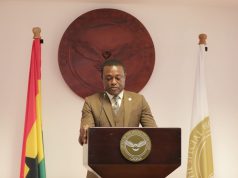Ghana’s Education Minister, Haruna Iddrisu, met with executives of the National Union of Ghana Students (NUGS) in Accra on Monday, February 24, to outline the government’s roadmap for transforming the country’s education sector.
The discussions focused on improving access, quality, and relevance across all levels of education, with Iddrisu reiterating President John Dramani Mahama’s pledge to prioritize reforms that equip students for future challenges.
“I pledged President Mahama’s commitment to improve the quality of education at all levels and prepare Ghanaian students for the opportunities ahead,” Iddrisu stated after the meeting. His remarks align with promises made during his parliamentary vetting on January 20, where he emphasized a three-pronged approach—access, quality, and relevance—as the cornerstone of the administration’s tertiary education agenda.
To address infrastructure gaps hindering enrollment, Iddrisu announced plans to expand facilities at universities and technical institutions. He also revealed ambitious proposals to establish model Science, Technology, Engineering, and Mathematics (STEM) schools in each of Ghana’s 16 regions, a move aimed at bridging the skills gap in critical sectors. “STEM education is not a luxury but a necessity for our nation’s development,” he asserted, underscoring the government’s focus on aligning education with economic and technological demands.
The Minister further addressed concerns about the future of the Free Senior High School (SHS) program, a flagship policy of the previous administration. While reaffirming that Mahama’s government would not scrap the initiative, Iddrisu hinted at a comprehensive review to address systemic flaws. “We will give true meaning to free, compulsory, and universal education,” he declared, suggesting reforms could target inefficiencies in funding, teacher shortages, and overcrowded classrooms.
The engagement with NUGS comes amid growing calls for stakeholder collaboration to tackle longstanding issues in Ghana’s education system, including outdated curricula, under-resourced schools, and disparities between urban and rural access. Student leaders have repeatedly urged the government to move beyond rhetoric and implement actionable policies, particularly in STEM and vocational training.
Iddrisu’s commitments, however, face scrutiny in a sector where grand promises often clash with logistical and financial realities. Critics argue that without sustained investment, political will, and transparency, even well-intentioned reforms risk stagnation. For now, the Minister’s dialogue with NUGS signals a willingness to engage grassroots voices—a critical step if Ghana is to translate its educational aspirations into tangible outcomes for millions of students.

















